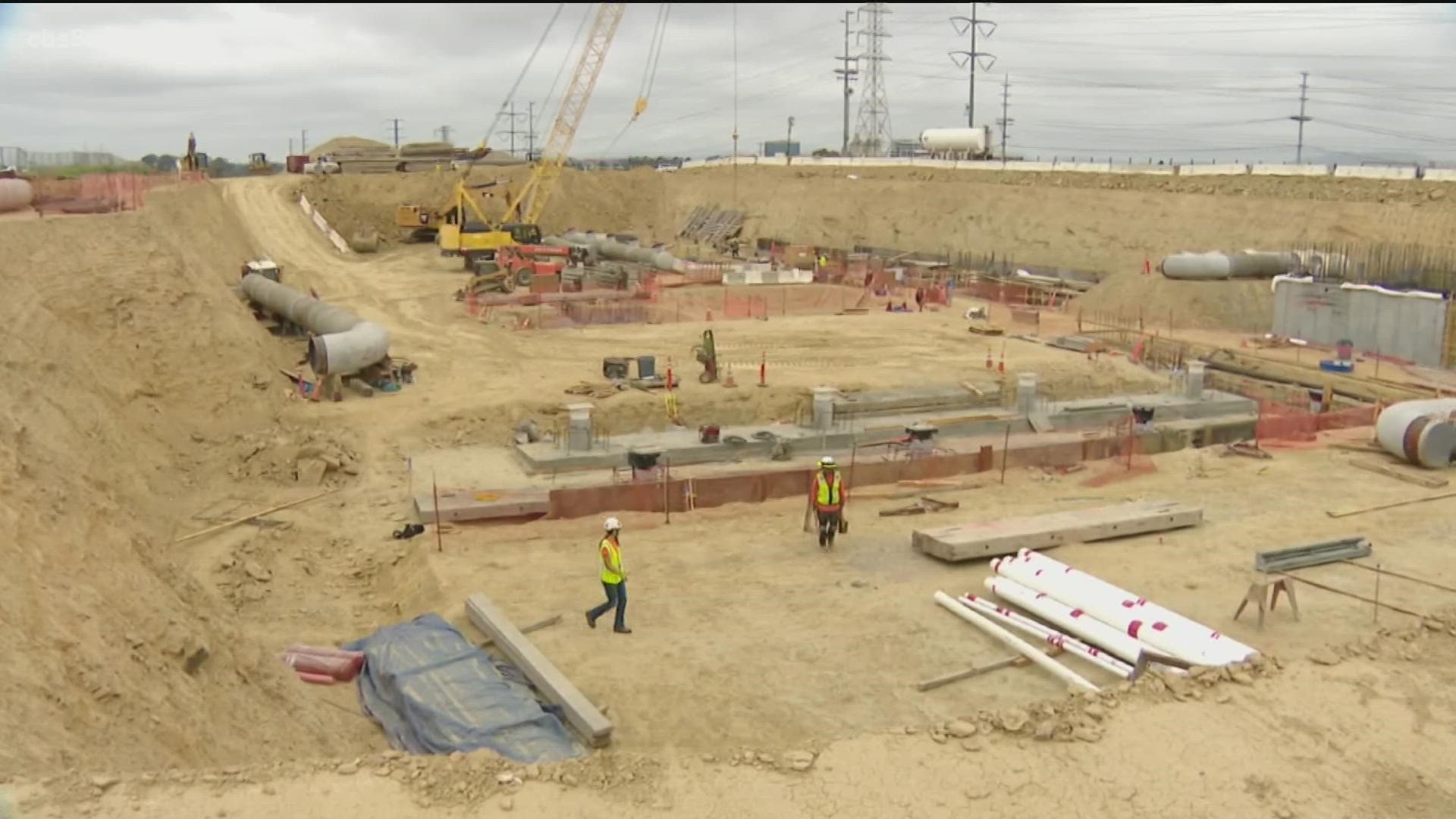SAN DIEGO — Mayor Todd Gloria, along with state and federal leaders, formally kicked off construction of Phase 1 of the city's Pure Water program Friday, intended to provide nearly 50% of the city's drinking water by 2035 and reduce the need for imported water.
"Today, we celebrated the launch of the largest, most ambitious infrastructure project in San Diego's history," Gloria said. "The Pure Water program will guarantee us a local water resource that allows San Diego to be drought-resilient and environmentally sustainable. This is a key part of how we will provide clean drinking water to our residents for generations to come."
Pure Water will use purification technology to clean recycled water and produce what is touted as safe, high-quality drinking water.
"Sweeping drought conditions, exacerbated by climate change, population growth, and historical over-drafting of water resources, have made meeting our water needs an enduring challenge," said Rep. Scott Peters, D-San Diego. "Just this week, U.S. officials declared the first-ever water shortage on the Colorado River, a critical water source for Southern Californians.
"That said, San Diego has been on the leading edge of water recycling with our Pure Water program. It will deploy cost-effective technology that will enhance our region's water sources -- technology that could one day be deployed by other communities to address water shortages," Peters concluded.
Phase 1 of the project includes 11 construction projects, including the North City Pure Water Facility and Pump Station, which is being built across the road from the North City Water Reclamation Plant. The other Phase 1 projects include pump stations and pipelines.
"Pure Water is a legacy project that promises to deliver a reliable source of clean water to our region for decades to come," said Senate President Pro Tem Toni Atkins, D-San Diego. "That is why I advocated for $50 million in this year's state budget to support Phase 1 of this vital infrastructure project."
"When I was a little girl, we didn't have running water or indoor plumbing in our home, so water is a precious resource I will never take for granted," she continued. "With worsening drought conditions in our state, this project is needed now more than ever."
The Pure Water facility is intended to treat recycled water produced at the nearby North City Water Reclamation Plant to purified water standards. The Pure Water facility will feature a state-of-the-art, five-step treatment process that includes ozonation, biological activated carbon filters, membrane filtration, reverse osmosis and ultraviolet light with advanced oxidation.
The Pure Water facility is intended to treat recycled water produced at the nearby North City Water Reclamation Plant to purified water standards. The Pure Water facility will feature a five-step treatment process that includes ozonation, biological activated carbon filters, membrane filtration, reverse osmosis and ultraviolet light with advanced oxidation.
San Diego imports as much as 90% of its water. The Pure Water Program is intended to cut that need in half. With threats of recurring droughts in California, having a local water resource is more important than ever.
"Climate stress is often experienced as water stress, something California knows all too well," said U.S. Environmental Protection Agency Administrator Michael S. Regan. "That's why we're prioritizing investments in innovative projects like Pure Water San Diego, which will improve the city's resilience to climate change impacts, protect water quality, and support the local economy by creating jobs."
Two Water Infrastructure Finance and Innovation Act loans from the EPA are providing funding for up to $733.5 million toward the program's Phase I projects. Additional funding for the construction of the project will come from Clean Water and Drinking Water State Revolving Fund loans in the amount of $665.1 million, and more than $80 million in federal and state grants, which do not need to be repaid.
The city will also receive a $340 credit from the Metropolitan Water District of Southern California for every acre-foot -- enough water to supply up to four households for a year -- produced for 25 years. This corresponds to a credit of $285.6 million over the life of the agreement, project leaders said.
Once operational, the new facility on Eastgate Mall is touted as having a production capacity of up to 34 million gallons a day. The purified water will then be conveyed via pipeline to Miramar Reservoir. The water will then be processed through the Miramar Water Treatment Plant before being delivered to customers.
WATCH RELATED: What alternative technologies are involved in supplying San Diego's water?

